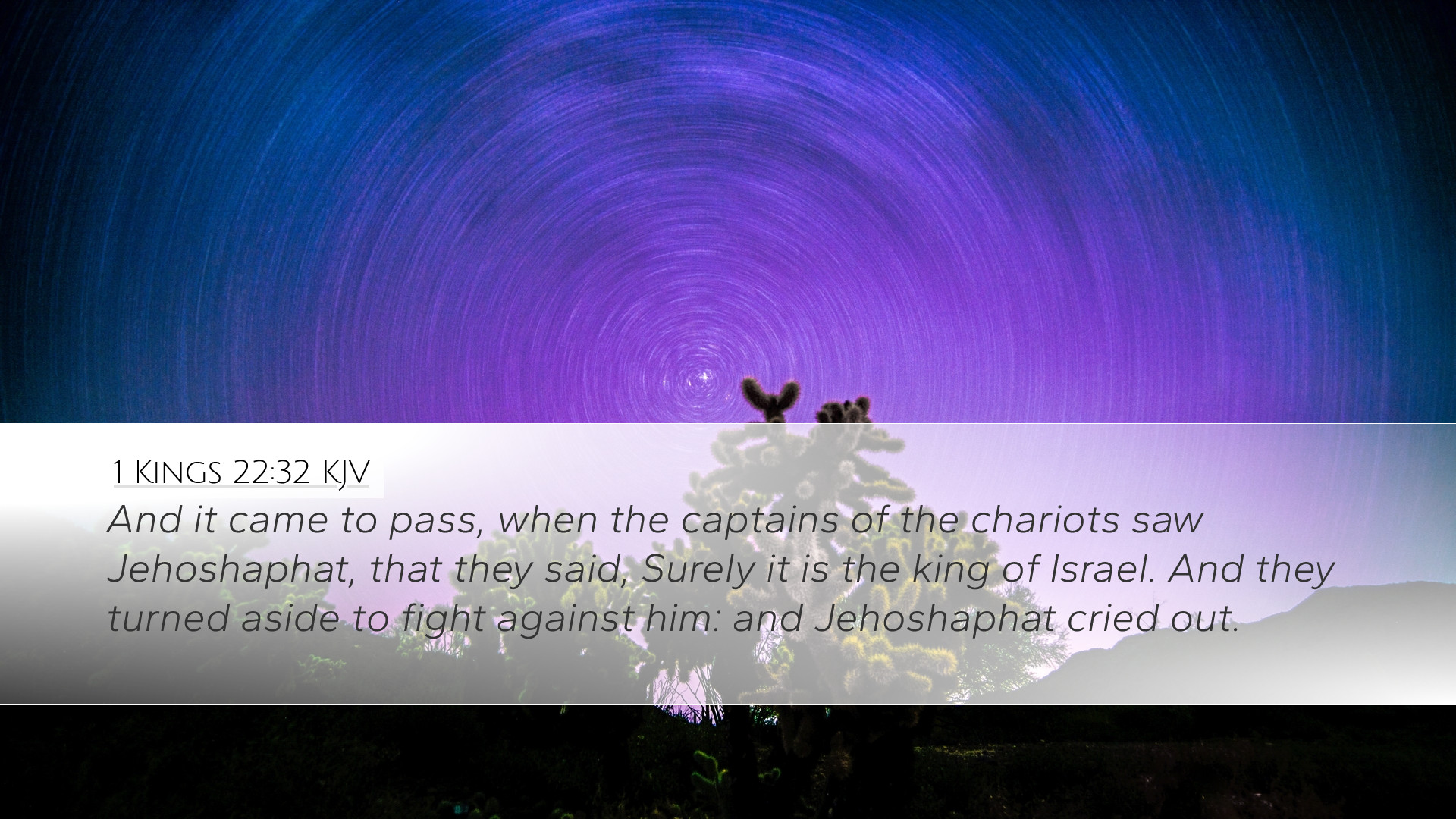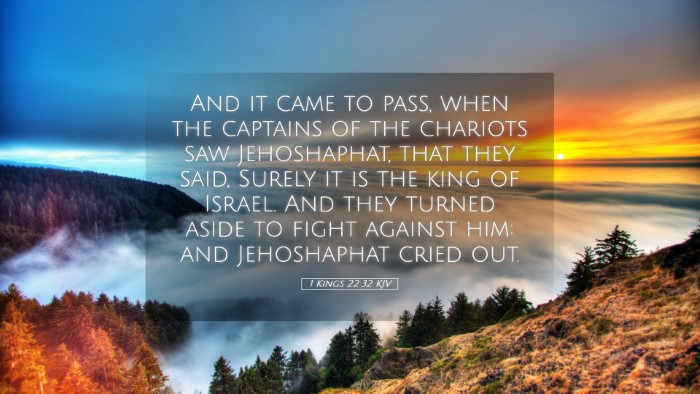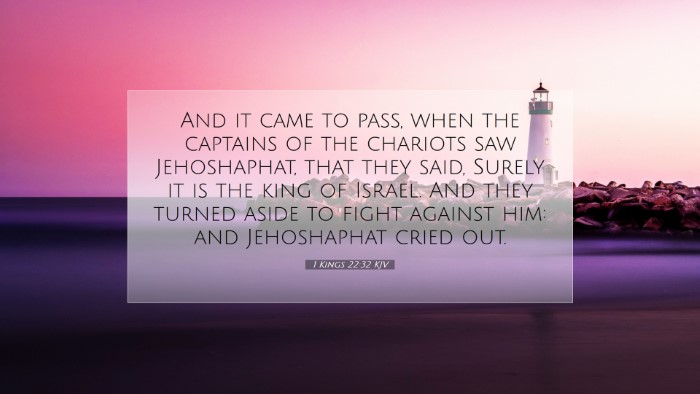Commentary on 1 Kings 22:32
Verse Context: The verse reads, "And it came to pass, when the captains of the chariots saw Jehoshaphat, that they said, Surely it is the king of Israel. And they turned aside to fight against him: and Jehoshaphat cried out."
Overview of the Passage
This passage falls within the narrative of the conflict between the kingdoms of Israel and Judah, encapsulating a pivotal moment during the reigns of Ahab of Israel and Jehoshaphat of Judah. The verse illustrates the charioteers’ misidentification of Jehoshaphat as Ahab, highlighting themes of mistaken identity, courage, and divine intervention.
Historical Background
The backdrop of 1 Kings 22 involves a coalition formed by Jehoshaphat, the king of Judah, and Ahab, the king of Israel. They band together to wage war against Ramoth-Gilead. Jehoshaphat’s willingness to ally with Ahab showcases the political dynamics and tensions of the time. Ahab’s court was known for its idolatry, in contrast to Jehoshaphat’s more faithful governance.
Commentary Insights
Matthew Henry's Commentary
Theme of Identity: Henry notes the significance of the captains misunderstanding Jehoshaphat for Ahab. This confusion emphasizes the physical resemblance that kings may bear based on their royal garb but also points to the moral decline of Ahab that Jehoshaphat was trying to distance himself from.
The Call for Help: Jehoshaphat's cry signifies both a plea for divine support and an acknowledgment of his precarious situation. His call reflects his awareness of his own vulnerability, despite his alliance with a more powerful king. Matt Henry emphasizes that recognizing our need for divine assistance is crucial in moments of peril.
Albert Barnes' Notes
Captains' Misconception: Barnes elaborates on the psychological aspect of the captains mistaking Jehoshaphat for Ahab. This error was not merely a tactical misjudgment; it represents the broader implications of sin leading one to be falsely identified with wrongdoing. Barnes reinforces that Jehoshaphat’s divine favor should be manifested through his actions, distinguishing himself from Ahab's character.
Jehoshaphat’s Response: In his commentary, Barnes focuses on Jehoshaphat's immediate reaction to the peril. Instead of fleeing, he cried out, which could be interpreted as a sign of faith amidst fear. His actions during this confrontation provide a model of trust in God's providence despite surrounding dangers.
Adam Clarke's Commentary
Examination of Character: Clarke’s insights delve deeper into the character of Jehoshaphat, emphasizing that he was a righteous king who sought to follow God’s ways. His alliance with Ahab can be viewed critically; however, Clarke argues that it was intended for peaceful purposes rather than malicious intent.
The Nature of Warfare: Clarke asserts that the ensuing battle serves as a reminder of the divine order in warfare. The misidentification in battle, wherein Jehoshaphat symbolizes God’s people, brings forth the narrative of reliance on divine strength rather than human power. The use of the term "cry" indicates a turning point where Jehoshaphat seeks God urgently in chaos.
Theological Reflections
This verse invites reflection on several significant theological themes:
- Divine Sovereignty: The verse illustrates how God oversees human affairs, directing outcomes according to His will. Even amidst confusion and chaos in battle, God's purposes are served.
- Faith in Adversity: Jehoshaphat's instance prompts believers to consider their response in times of crisis. His cry to God underlines a reliance on divine aid rather than mere human alliances.
- Identification with Christ: The mistaken identity serves as a metaphor for believers’ identification with Christ, highlighting how one should reflect Christ's character in contrast to a fallen world.
Practical Applications
For Pastors: The lesson of Jehoshaphat can be applied in pastoral care. Equipping congregants to cry out to God in times of trouble fosters a reliance on divine strength, helping the faithful to navigate the struggles of life.
For Students and Theologians: This text encourages an exploration of the dynamics between faith and politics, stressing the importance of aligning with God's will amidst worldly influences. It challenges scholars to investigate the historical implications of Jehoshaphat's alliances.
Conclusion
1 Kings 22:32 encapsulates a dramatic moment that reflects the multifaceted themes of identity, divine providence, and response to adversity. The collaborative insights from Matthew Henry, Albert Barnes, and Adam Clarke invite introspection on the reliance upon God while navigating the complexities of life and leadership. The narrative serves not only as a historical account but also as a timeless lesson for believers today.


